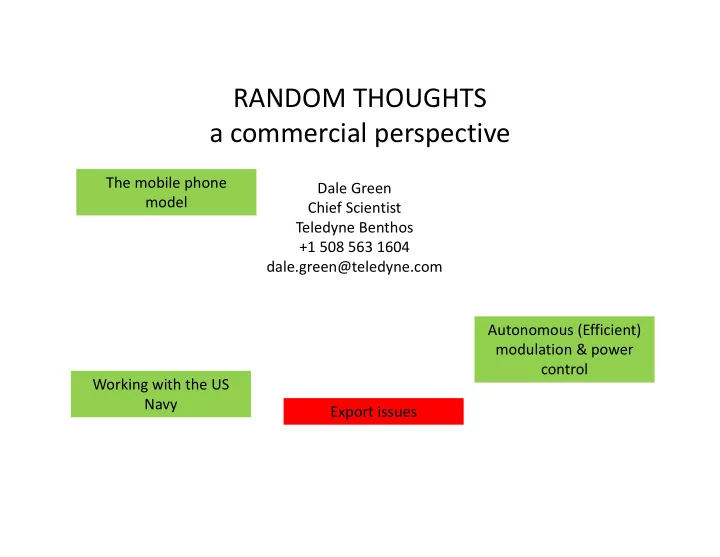

RANDOM THOUGHTS a commercial perspective The mobile phone Dale Green model Chief Scientist Teledyne Benthos +1 508 563 1604 dale.green@teledyne.com Autonomous (Efficient) modulation & power control Working with the US Navy Export issues
Autonomous (Efficient) modulation & power control In a dynamic channel – time varying multipath, platform motion, time ‐ varying interference, and LATENCY How do you transmit at just the right power level? How do you pick the “best” modulation scheme? Some vendors simply bang away between two modems until a solution is found Big waste of batteries Very hard to synchronize with platform motion I don’t know the answer
The Mobile Phone Model • ACOMMS is becoming a commodity. Still a lot of academic work to do, but multiple vendors can provide “acomms.” • Any modem has a substantial dsp infrastructure available. How can you use it to support your customer? 1. Sonar signal processing (whales, shipping ??) 2. Sensor support – processing, data storage, shared resources 3. Navigation aids – bring acomms methods (modulation, detection, timing accuracy) to support LBL, USBL, GPS, etc.
Working with the US Navy • This is a cautionary tale • The Navy used to be a major source of R&D funding for acomms, but this is largely disappearing under funding and operational pressures. • If you do receive R&D funding, try to precisely identify your pre ‐ existing IP before you take the job – otherwise the Government is likely to claim ownership and control. • Your work will likely be declared ITAR controlled – and thus so will future developments based on this work – forever. • SBIRs are wonderful at the beginning, but…..
ITAR • This is a cautionary tale • If you develop technology for the US military, or from within the US for any foreign military, your technology may be controlled under ITAR – Outside the US you cannot discuss, describe, market, or sell your technology without, at a minimum, a license – You and your company can be fined and/or go to jail (you) – There are no appeals, no justifications, no acknowledgement of domestic or foreign competition of a similar capability – You’ll never discover the qualifications of the individuals making the decisions – Your company may be concerned about retribution if it protests. • AND, all of the above is true is you develop the technology completely with your own money for purely commercial applications • You might guess that this annoys me
Recommend
More recommend